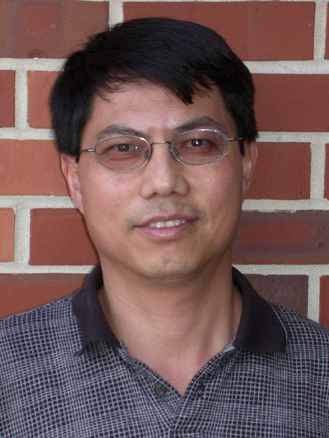Jian Ge, Ph.D.
Professor of Astronomy
College of Liberal Arts and Sciences
2010 Awardee
 The major goals of astronomy are to address the following questions: “Are we alone? How do planets form? How do galaxies form and evolve in the universe?” Astronomy professor Jian Ge has developed three major advanced instrument technologies to address these fundamental issues. He has developed Doppler techniques with multiobject capability, extremely high precision and near infrared capability, and silicon immersion gratings with extremely high dispersion power and high contract imaging technique.
The major goals of astronomy are to address the following questions: “Are we alone? How do planets form? How do galaxies form and evolve in the universe?” Astronomy professor Jian Ge has developed three major advanced instrument technologies to address these fundamental issues. He has developed Doppler techniques with multiobject capability, extremely high precision and near infrared capability, and silicon immersion gratings with extremely high dispersion power and high contract imaging technique. Ge is leading an international team of over 30 scientists in conducting the largest ground-based Doppler planet survey, called Multi-object APO Radial Velocity Exoplanet Large-area Survey (MARVELS), as part of the on-going SDSS-III program in 2008-2014 to search an estimated 10,000 solar type bright stars, detecting hundreds of new extrasolar planets for statistical study of planet properties, formation, and evolution. Ge’s team has found two new planets, five brown dwarfs, and hundreds of new binary stars. Ge is leading a second international team of over 20 scientists and engineers in establishing a global Doppler network using two extremely high precision Doppler instruments built by Ge’s team, detecting Earth like planets around nearby solar type stars. Ge is leading a U.S. team consisting of 15 scientists and engineers in developing a Florida IR Silicon immersion grating spectromeTer (FIRST) and an Infrared Exoplanet Tracker (IRET) instrument for detecting and characterizing possible habitable planets around nearby low mass red stars. Ge’s planet detection and technology innovations have been highlighted by hundreds of international news media.
Besides extrasolar planet surveys, Ge is leading a third international team of astronomers to search for extremely red quasar absorber galaxies with strong UV extinction bump in the early universe to study quasar environments, galaxy evolution, and intergalactic medium. To date, they have discovered over 40 of these rare objects. Ge is also leading a UF interdisciplinary team in developing integrated multi-target wide field remote sensing technologies for national security and defense.
Ge will continue to lead an international team of over 100 scientists and engineers to develop 1000 object capability optical spectrographs for the world’s largest telescope, the Gran Telescopio Canarias, and launch a large-scale sky survey to observe over 1 million distant galaxies in the early universe.

